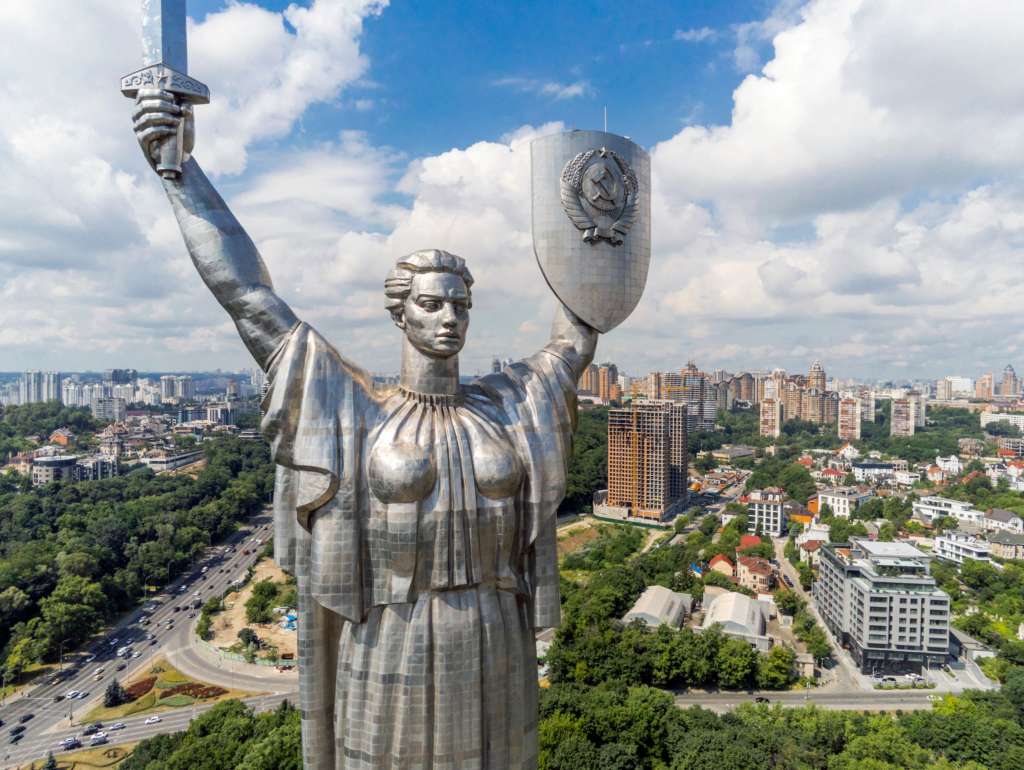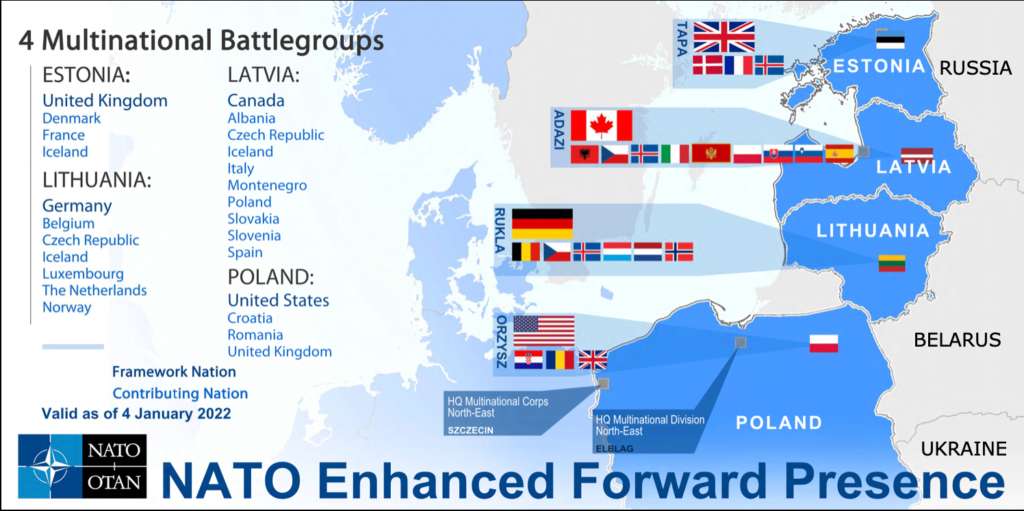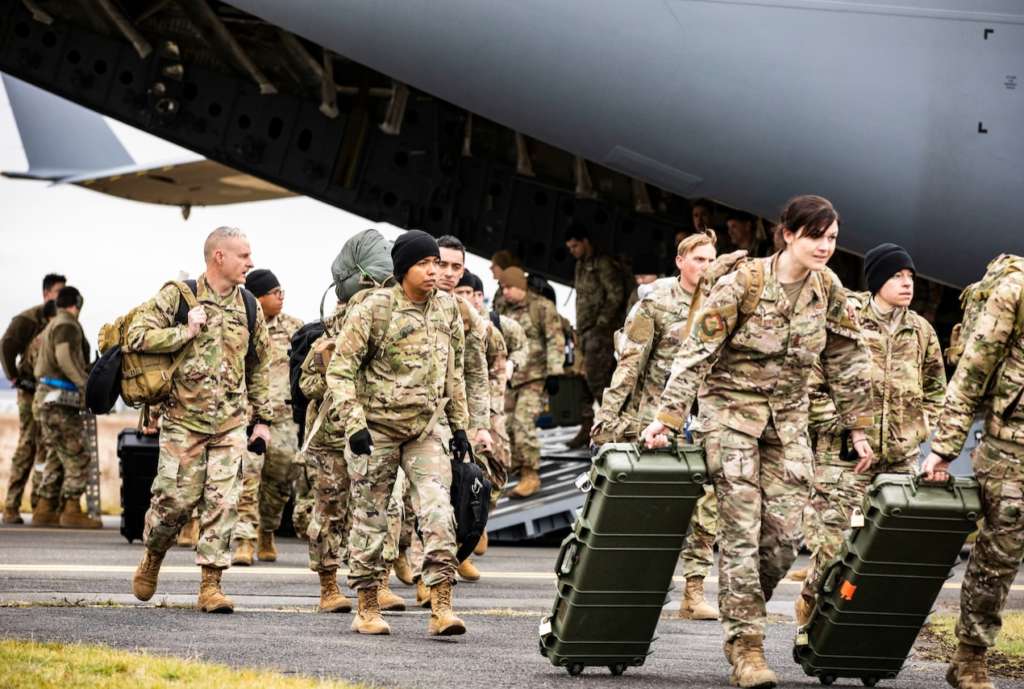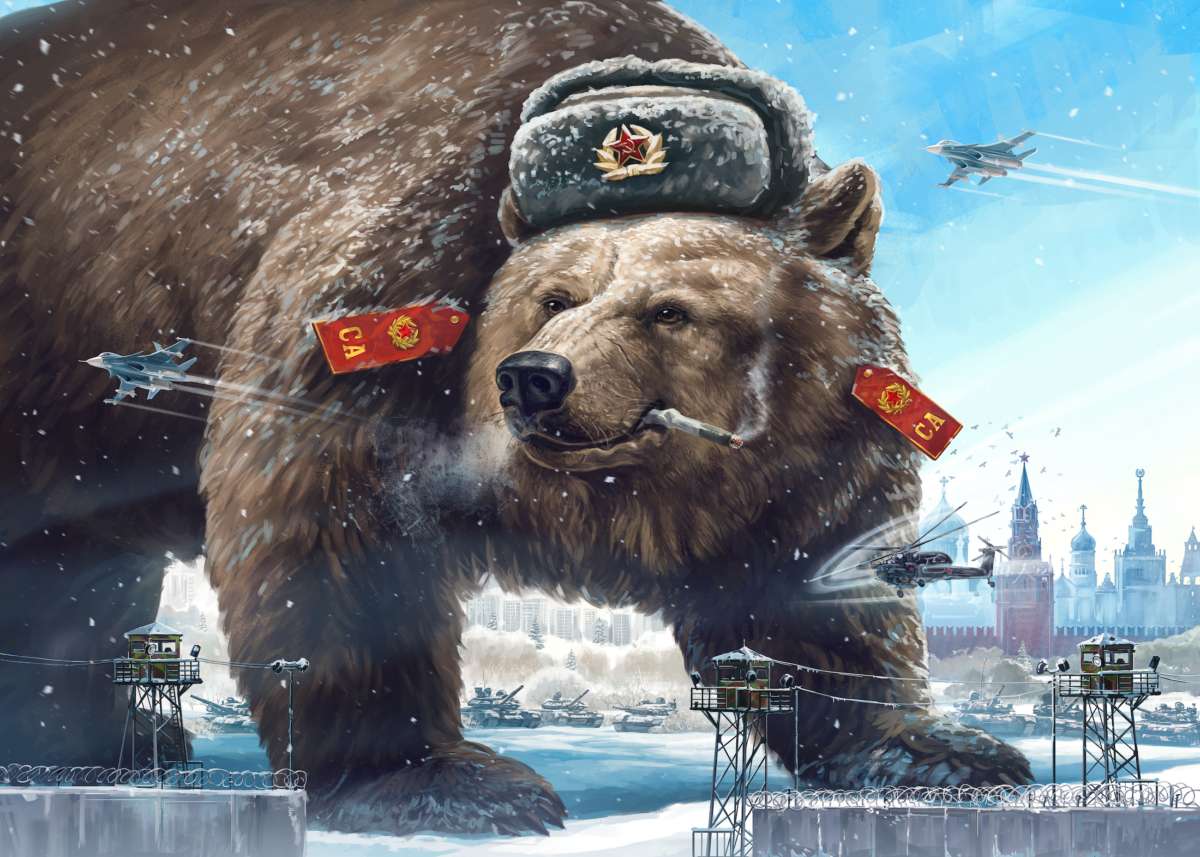Wars and rumors of war
In His Olivet Discourse (Matthew 24), Jesus spoke of the end times, specifically of “wars and rumors of war,” warning that these were signs that the end was approaching. Indeed, we’ve had perhaps hundreds of such conflicts since He first spoke these words. So, war is nothing new. What is new is the ability of one person with his finger on the “button” to destroy civilization. I recently heard Ret. US Army General Wesley Clark, the former Supreme Allied Commander in Europe, remark that every Russian military exercise ends with a nuclear weapons release simulation (and, according to news accounts, the Russians are planning such an exercise at this very moment when tensions are at a feverish pitch.) Taken from William Shakespeare “The Winters Tale,” the title of this post Exit, Pursued by a Bear seems to be most apt.
A State Department bulletin last month included a stark warning of what the United States and its NATO allies believed was now possible, even likely: War in Europe. After half a century of Cold War when the allies faced a threat from the Soviet Union (led by Mother Russia), and a decade or two of restless peace since, Russia again appears to be on the move. Since that State Department bulletin on January 23rd, almost every single event that followed only seems to reinforce this grim assessment. The bulletin reads:

“Do not travel to Ukraine due to the increased threats of Russian military action and COVID-19. Exercise increased caution in Ukraine due to crime and civil unrest. Some areas have increased risk. On January 23, 2022, the Department of State authorized the voluntary departure of U.S. direct hire employees (USDH) and ordered the departure of eligible family members (EFM) from Embassy Kyiv due to the continued threat of Russian military action. U.S. citizens in Ukraine should consider departing now using commercial or other privately available transportation options.There are reports Russia is planning significant military action against Ukraine. The security conditions, particularly along Ukraine‘s borders, in Russia-occupied Crimea, and in Russia-controlled eastern Ukraine, are unpredictable and can deteriorate with little notice. Demonstrations, which have turned violent at times, regularly occur throughout Ukraine, including in Kyiv.U.S. citizens in Ukraine should be aware that Russian military action anywhere in Ukraine would severely impact the U.S. Embassy’s ability to provide consular services, including assistance to U.S. citizens in departing Ukraine.”
https://travel.state.gov/content/travel/en/traveladvisories/traveladvisories/ukraine-travel-advisory.html
The birth of an alliance
The North Atlantic Treaty Organization (NATO) was designed to be a barrier or bulwark against communism and its further expansion westward. To confront NATO which was formed in 1949, the Soviet Union created the Warsaw Pact among the conquered, communist allies in Europe. Back then, the closest that U.S. troops could approach to Russia was West Germany, or perhaps, Turkey. But with the fall of communism, the communist countries in Eastern Europe have become democracies (more or less) and with their newly-found freedom, have sought membership in NATO to protect them from Russian invasion should the fancy to go “back to the future” strike Moscow again. In 1999, the Czech Republic, Hungary and Poland became NATO members. In March 2003, Bulgaria, Lithuania, Slavakia, and Slovenia joined. So did Romania (which now has U.S. Aegis SM-3 antiballistic missiles in its country) and Latvia and Estonia which border Russia. If you look at the NATO map below, you’ll see that it provides for a British and Canadian military presence on Russia’s border. So, there are regularly close to 1,000 British soldiers just across the Russian border with Latvia. Canada, for it’s part, has allowed many Estonians to immigrate to Canada. A good deal of these partnerships with new NATO members deal with commerce, travel and training military forces. But clearly NATO is a bulwark against Russian expansionism (an ambition we saw when Russian President Vladimir Putin annexed the Crimea in 2014 which belonged to the Ukraine) and the current Secretary General of NATO, Jens Stoltenberg is determined to “keep the faith.”

In 2009, former Soviet Republic Albania and also the post Cold War Republic of Croatia joined NATO. Putin, looking at the same map above, sees himself threatened by encroaching NATO forces in countries that now prefer the West rather than Russia for their protection and prosperity. Who else is NATO sworn to protect its members from if not Russia?
Putin also insists that when the Soviet Union was breaking up and the Soviet republics were moving towards freedom and democracy, that Mikhal Gorbachev was given assurances that if these new republics at some point joined NATO, then there would not be missiles and foreign forces deployed in those countries. Such assurances were apparently never committed to writing as a memorandum. Were there verbal assurances given? President G.W. Bush would know, but never spoke of it before he died. Gorbachev is not speaking about it, either, nor is James Baker, the U.S. Secretary of State who was in the thick of the negotiations when the Berlin Wall fell (Russia was particularly sensitive about the future of a united Germany given the fact that they had been invaded by Germany twice in the first forty years of the twentieth century.). However, German Ambassador Rolf Nikel, who was priviy to these negotiations and protocols assured the participants at a recent Atlantic Council webinar that such guarantees were never asked for by the Russian side, nor offered by the American/NATO side.

As the days pass, prospects of a diplomatic settlement are wanning. Russia has moved blood supplies to the front lines on the Ukrainian border while the Russian General Staff is currently in Belarus, certainly a country to be a co-belligerent with Russian against Ukraine. The news today is that Russia is establishing radio relay communication systems, necessary if war were to break out.
The Ukraine
Ukraine is known as the “bread basket” of that part of the world because of their grain harvests. In fact, the color gold in the Ukrainian flag represents wheat. Ukraine is slightly small than Texas, with almost 44,000,000 people living there. The population of the country is overwhelmingly Ukraine, though seventeen percent are Russian. The population in Eastern Ukraine is arguably more sympathetic towards Moscow, while western Ukraine is more oriented towards Europe and the West. For many years, there has been a violent conflict between these two factions. Were the people of Ukraine given the opportunity to vote freely on whether to join ask NATO for membership status, Ukraine might very well wind up joining the partnership. But Russia has made this future prospect the last straw, threatening war if that ever happened.
Will it be war?
Putin sees Russia, Belarus and the Ukraine as one People, one nation. Losing Estonia, Romania or Bulgaria to the West is one thing for Putin. Losing Ukraine is quite another. Believing as he does in the historical foundations of “Old Russ,” having Ukraine go their own way might be too bitter of a pill for him to swallow. To him, this issue with Ukraine is a family matter.
As time passes, it becomes increasingly difficult for Putin to save face in this crisis, and so far there is no indication that anyone has a way to make it easy for him to back down. I think the most likely scenario is for a large cyberattack to cripple and isolate the Ukraine government and infrastructure while Russia moves quickly to Kiev to set up a puppet government, plus round up some patriotic Ukranians or anti-Russian dissidents to make it worth their time and expense. The casus belli might be to protect the Russian minority in the eastern part of the country. Or, he may revive his “little green men” strategy. In Russia, these special ops troops are grimly, perhaps sarcastically known as “Polite People.”
Putin carefully follows the internal turmoil in the U.S. over everything from the pandemic to the President’s low poll numbers and given the lack of a solid partisan majority in the Senate and the current President’s <ahem> advancing age, while noting sympathetic conservative opinion leaders in this country who are either tired of wars overseas or who have some affinity for Putin, Putin may be tempted to strike now. In some sense, the war may have truly begun years ago when Russia seized the Crimea.
It will be difficult to contain the conflict once the shooting starts. LTC (USA Ret.) Alexander Vindman, a Ukraaine policy expert said recently (if my memory serves me correctly) that sending more U.S. or NATO troops to the region after a Russian invasion began might itself be seen as an escalation, moving the onus from Putin to Biden.
There is also the potential for China to use any major international crisis to create their own fait accompli as far as Taiwan goes, invading that last bastion of democracy for Chinese which the U.S. tacitly acknowledges as part of China anyway. Then, too, Israel would need little prompting to attempt to knock out Iran’s nuclear potential if all eyes are on the Ukraine. The noise you’d hear when the air strikes are over would be the applause from the Arab states in the Gulf Region.
So, the next few weeks are critical. At the moment, the snow pack is melting making it difficult for Russian tanks to move around. CNN this morning has an excellent story on signs that war may be imminent. You can read the story here. See also here for more information.
I truly hope there is no war. But at the moment, it seems to be a distinct possibly, and one of the few issues that politicians can agree on anymore.
p.s. If you only read one article about the crisis, why Putin is behaving as he is, what he hopes to achieve, it should be this interview with Michael Kimmage (right) from CNN. It is the best that I’ve seen.
I’ve elected to turn this post into a “blog within a blog” presenting news related to this crisis as it unfolds:
February 12, 2022: The Washington Post and other outlets are reporting that Moscow is evacuating at least some of its embassy workers from Kiev. Meanwhile, President Biden is scheduled to speak today with President Putin at Washington’s request. Also in the WP, Finland, a country that walks a fine line between Russia and the West has announced that it will purchase military equipment from the U.S.
February 11, 2022: The Bulletin of the Atomic Scientists reports that Russian media are accusing the U.S. of introducing/producing biological warfare agents in the Ukraine.
February 10, 2022: The press is repeatedly pressing the Pentagon to allow reporters to be embedded with American forces in Poland to cover new relating to the crisis in the Ukraine. So far, the Pentagon has refused their requests. It is important in a democracy to have as much transparency and free flow of information as possible. Obviously, classified information, troop movements, etc. cannot always be disclosed, but the press allows some degree of accountability.




